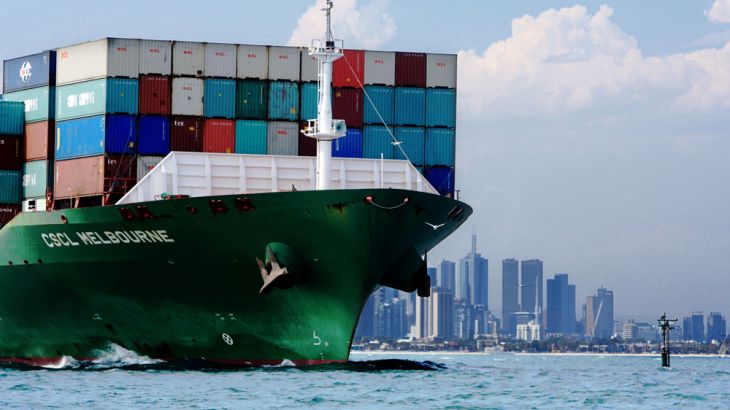
Australia and China: Turning the page
We look at Australia’s changing relationship with its biggest trading partner China and challenges facing the country.
Australia, a vast continent rich in natural resources, is enjoying the longest economic expansion in the developed world – 24 years and counting. Much of that boom was built on exports of commodities like iron ore to China.
As the Chinese economy grows, and the government is looking to reposition the performance of the Chinese economy ... what Australia will be looking to do is to try to harness those opportunities and export services into the Chinese economy ... tourism services ... education services as well as our professional services.
China is the country’s biggest trading partner, but the Chinese economy is changing from manufacturing to an economy that is more focused on domestic demand.
Keep reading
list of 4 itemsWhy are nations racing to buy weapons?
Parallel economy: How Russia is defying the West’s boycott
US House approves aid package worth billions for Ukraine, Israel
Chinese buyers are also on the hunt for foreign assets. In early August, Australia blocked two Chinese bidders from buying state-owned power network Ausgrid. Tensions in the South China Sea have also complicated the relationship.
What effect is the overall commodities slump having on Australia’s economy and how will it adapt? What is next for Australia and China? And what happens to Australia if the demand from Chinese markets starts to slow down?
We speak to Brendan Rynne, KPMG Australia’s chief economist, and discuss the state and the future of Australia’s economy.
Also, Yaara Bou Melhem reports from New South Wales on how the sheep and wool industry is making a comeback.
Retirement industry: How old do you have to be before you can stop working?
Japan, the world’s third-largest economy, has one of the highest number of elderly citizens on the planet.
Over the next 20 years, the number of people over the age of 75 is expected to make up 30 percent of the population. And that is having a big impact on the economy as well as society in general.
Some companies have already taken matters into their own hands and opted for hi-tech solutions to helping people work beyond retirement age.
And Japan is not the only country encouraging people to work beyond retirement age: Finland makes its population work until the age of 68 before they’re able to claim state pension; in Greece, people have to work until 67; and recently, young Germans were told they might have to work until they are 69 years old.
For the past decade, governments across the developing world have been cutting the pension bill by increasing the retirement age; that’s because people are living longer and birth rates are declining.
But how will this affect future generations? How old does one now need to be before they can stop working?
We discuss the pensions crisis around the world with Tom McPhail, head of Pensions Research.
Shifting tourism
Egypt’s tourism industry is in crisis: The number of foreign tourists fell 46.5 percent year on year in the first quarter of 2016. Tunisia saw tourist arrivals drop over 18 percent in the first quarter of the year, and Turkey’s tourism sector contracted sharply in the first three months of 2016.
Portugal and Italy are shaping up to be the biggest winners. In Italy, the number of people visiting this year is already up on a record, and some local authorities are even thinking on limiting tourist access.
“This year, we have seen a shift from … traditional destinations in the Middle East and in Europe to new destinations in southern Europe. There is no doubt that the attack in Paris and the situation in Egypt, Tunisia and Turkey have made tourists choose [safer] destinations, such as Spain, Portugal and Greece,” explains Kinda Chebib, a senior analyst for Euromonitor International in London.
So, what are people looking for when they travel? Will this shift dramatically affect other economies?
We discuss the future of the tourism industry with Chebib.